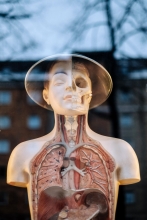Arguing in a Boston courtroom in 1770, John Adams famously pronounced, “Facts are stubborn things,” which cannot be altered by “our wishes, our inclinations or the dictates of our passion.”
But facts, however stubborn, must pass through the trials of human perception before being acknowledged — or “canonized” — as facts. Given this, some may be forgiven for looking at passionate debates over the color of a dress and wondering if facts are up to the challenge.
Carl Bergstrom believes facts stand a fighting chance, especially if science has their back. A professor of biology at the University of Washington, he has used mathematical modeling to investigate the practice of science, and how science could be shaped by the biases and incentives inherent to human institutions.
“Science is a process of revealing facts through experimentation,” said Bergstrom. “But science is also a human endeavor, built on human institutions. Scientists seek status and respond to incentives just like anyone else does. So it is worth asking — with precise, answerable questions — if, when and how these incentives affect the practice of science.”
Read full article in UW Today.

